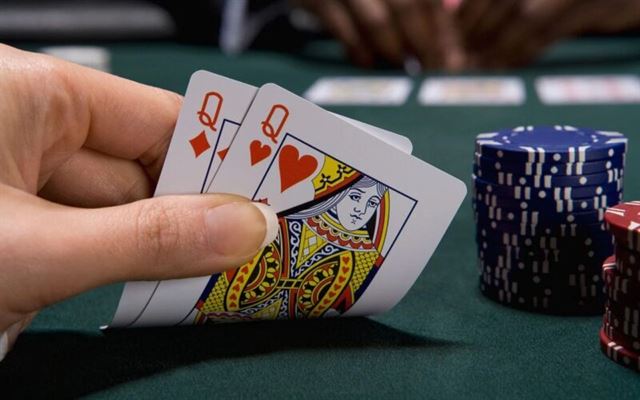Poker is a game that requires skill, strategy, and a bit of luck. While many players focus on mastering the various strategies and techniques, there is one key element that often gets overlooked: patience. Patience in poker is not just about waiting for good hands; it’s about having the discipline and control to make the right decisions at the right time.
The Importance of Patience in Poker: How It Can Lead to Consistent Wins
One of the biggest mistakes that novice poker players make is playing too many hands. They get caught up in the excitement of the game and want to be involved in every hand. However, this can lead to costly mistakes and unnecessary losses. By exercising patience and only playing strong starting hands, players can significantly increase their chances of winning.
Patience also plays a crucial role in avoiding tilt. Tilt is a state of emotional frustration or anger that can cloud a player’s judgment and cause them to make irrational decisions. It often occurs after a bad beat or a series of unlucky hands. Without patience, players are more likely to let their emotions get the best of them and make impulsive moves that they will later regret. By staying calm and patient, players can maintain their focus and make rational decisions based on logic rather than emotion.
Another benefit of patience in poker is the ability to read opponents. When players exercise patience and fold weaker hands, they have more time to observe their opponents’ betting patterns and behavior. This allows them to gain valuable insights into their opponents’ strategies and tendencies. By patiently gathering information, players can adjust their own strategies accordingly and exploit their opponents’ weaknesses.
Furthermore, patience in poker is essential for bankroll management. A common mistake among amateur players is playing with stakes that are too high for their bankroll. They chase big wins and fail to consider the risks involved. This lack of patience and discipline can quickly deplete their funds and force them out of the game. On the other hand, patient players understand the importance of managing their bankroll and only playing within their means. They are willing to grind it out at lower stakes, slowly building their bankroll over time.
Patience also comes into play during the decision-making process in poker. When faced with a difficult decision, such as whether to call or fold, patient players take their time to analyze the situation and consider all possible outcomes. They weigh the potential risks and rewards before making a move. This calculated approach often leads to better decisions and ultimately, more consistent wins.
In conclusion, patience is an essential skill in poker that can lead to consistent wins. It allows players to make rational decisions, avoid tilt, read opponents, manage their bankroll effectively, and improve their overall game. While it may not be as flashy or exciting as other aspects of poker, patience is what separates the winners from the losers in the long run. So next time you sit down at the poker table, remember to exercise patience and control – it could be the winning edge you’ve been missing.
Developing Discipline and Control for a Winning Edge in Poker
In the world of poker, where fortunes can be won or lost in an instant, developing discipline and control is crucial for achieving a winning edge. While many players focus solely on their technical skills and knowledge of the game, it is often the mental aspect that separates the winners from the losers. Patience, self-control, and emotional stability are all qualities that can make or break a poker player’s success.
One of the first steps in developing discipline and control is understanding the importance of patience. In poker, impulsive decisions can lead to disastrous consequences. It is essential to resist the temptation to act hastily and instead wait for the right moment to strike. This requires a deep understanding of the game and the ability to read opponents’ intentions. By patiently observing the table dynamics and waiting for favorable opportunities, players can maximize their chances of success.
Self-control is another critical element in poker. It involves managing emotions and avoiding tilt, which is a state of frustration and anger that clouds judgment. Tilt can occur after a bad beat or a series of losses, leading players to make irrational decisions in an attempt to recover their losses quickly. A disciplined player understands that emotions have no place at the poker table and knows when to step back and regain composure. By maintaining self-control, players can stay focused on making rational decisions based on probabilities rather than being driven by emotions.
Furthermore, emotional stability plays a vital role in poker. The game is filled with ups and downs, and it is easy to get carried away by both triumphs and setbacks. However, a successful player remains level-headed throughout these fluctuations. They do not allow themselves to become overly excited by a big win or demoralized by a significant loss. Instead, they maintain a steady mindset, knowing that each hand is independent and that long-term results matter more than short-term outcomes.
Developing discipline and control in poker requires practice and self-reflection. It is crucial to analyze one’s own gameplay objectively, identifying areas where discipline may have wavered or control was lost. By recognizing these patterns, players can work on improving their weaknesses and strengthening their mental game. This might involve setting limits on the number of hands played or taking breaks when emotions start to rise. Additionally, seeking guidance from experienced players or even hiring a poker coach can provide valuable insights into developing discipline and control.
In conclusion, patience, self-control, and emotional stability are essential qualities for achieving a winning edge in poker. Developing discipline and control allows players to make rational decisions based on probabilities rather than being driven by impulsive actions or emotions. By understanding the importance of waiting for the right moment, managing emotions, and maintaining a steady mindset, players can maximize their chances of success at the poker table. While technical skills and knowledge of the game are undoubtedly important, it is the mental aspect that often separates the winners from the losers. So, embrace discipline and control, as they are the keys to unlocking your full potential in the world of poker.
Strategies for Maintaining Patience at the Poker Table: Tips from the Pros
In the fast-paced world of poker, patience is often touted as one of the most important qualities a player can possess. It is the ability to wait for the right moment, to bide your time, and to resist the urge to make impulsive decisions that sets successful players apart from the rest. In this article, we will delve into some strategies for maintaining patience at the poker table, with insights from seasoned professionals who have mastered the art of discipline and control.
First and foremost, it is crucial to understand that poker is a game of skill and strategy, not luck. Many beginners fall into the trap of thinking that they need to constantly be in action, playing every hand dealt to them. However, experienced players know that selective aggression is key. They patiently wait for strong starting hands and fold weaker ones, conserving their chips for when the odds are in their favor.
Another tip from the pros is to avoid getting emotionally attached to any particular hand or outcome. Poker is a long-term game, and individual losses or wins should not dictate your overall strategy. By staying calm and detached, you can make rational decisions based on probabilities and expected value rather than being swayed by short-term fluctuations.
Furthermore, it is essential to maintain focus and concentration throughout the game. Distractions can easily derail your patience and lead to impulsive actions. Successful players advise finding a quiet environment free from distractions, such as loud music or excessive conversation. This allows you to fully immerse yourself in the game and make well-thought-out decisions.
An often overlooked aspect of maintaining patience is managing your bankroll effectively. Professionals emphasize the importance of setting limits and sticking to them. By having a clear budget in mind, you can avoid chasing losses or making reckless bets out of frustration. Patience extends beyond individual hands; it also applies to your overall approach to the game.
Additionally, seasoned players recommend taking breaks when needed. Poker can be mentally and emotionally taxing, and stepping away from the table for a few minutes can help refresh your mind and prevent tilt. Tilt refers to a state of emotional frustration or anger that can cloud judgment and lead to poor decision-making. Recognizing when you are becoming tilted and taking a break can save you from costly mistakes.
Finally, one of the most effective strategies for maintaining patience is simply practicing self-discipline. This means sticking to your game plan, even when faced with tempting opportunities or challenging opponents. It requires a strong willpower to resist the urge to deviate from your strategy, but in the long run, it pays off. By staying disciplined, you avoid making impulsive moves that could jeopardize your chances of winning.
In conclusion, patience is an invaluable skill in poker that separates successful players from the rest. Strategies for maintaining patience at the poker table include being selective with starting hands, remaining emotionally detached, staying focused, managing your bankroll effectively, taking breaks when necessary, and practicing self-discipline. By incorporating these tips from the pros into your own game, you can gain the winning edge and elevate your poker skills to new heights.
Unlocking Success in Poker through Patience and Self-Restraint
Poker is a game that requires not only skill and strategy but also discipline and control. Many players underestimate the importance of patience in this game, often opting for impulsive and reckless moves instead. However, those who have mastered the art of patience understand that it is the key to unlocking success in poker.
One of the fundamental aspects of patience in poker is waiting for the right moment to make a move. In a fast-paced game where decisions need to be made quickly, it can be tempting to jump into every hand and chase after any potential winning opportunity. But seasoned players know that this approach is a recipe for disaster. Instead, they exercise restraint and wait for favorable situations before making their move.
This level of self-restraint goes beyond just waiting for good hands; it extends to controlling emotions as well. Poker is a game that can easily evoke strong emotions, such as excitement or frustration. Players who lack patience may find themselves making irrational decisions based on these emotions, which often lead to costly mistakes. On the other hand, patient players are able to keep their cool and make calculated decisions, even in the face of adversity.
Another aspect of patience in poker is knowing when to fold. It can be difficult to let go of a hand, especially if you’ve invested time and money into it. But sometimes, folding is the best decision one can make. Patient players understand that not all hands are worth pursuing, and they are willing to cut their losses and move on. This ability to recognize when to fold saves them from wasting valuable resources on hopeless endeavors.
Furthermore, patience in poker also involves understanding the concept of variance. Variance refers to the natural fluctuations in luck that occur in the short term. Even the most skilled player can experience a series of bad beats or unlucky draws. However, patient players understand that variance is just a temporary setback and that over the long run, skill will prevail. They do not let short-term losses discourage them or affect their decision-making process.
Patience in poker also means being able to adapt to different playing styles and situations. Every game is unique, and what works in one situation may not work in another. Patient players are willing to take the time to observe and analyze their opponents’ strategies before making any moves. They understand that rushing into action without proper assessment can lead to disastrous outcomes. By patiently observing and adapting, they gain valuable insights that give them an edge over their opponents.
In conclusion, patience is an essential trait for success in poker. It allows players to wait for the right moment, exercise self-restraint, and make calculated decisions. Patient players understand when to fold and when to persevere, and they have the ability to adapt to changing circumstances. While it may be tempting to rush into every hand and let emotions dictate actions, those who embrace patience will ultimately come out on top. So next time you sit down at a poker table, remember that patience pays – it’s the winning edge that sets apart the champions from the amateurs.





